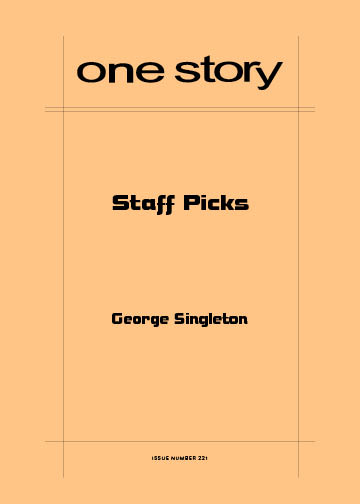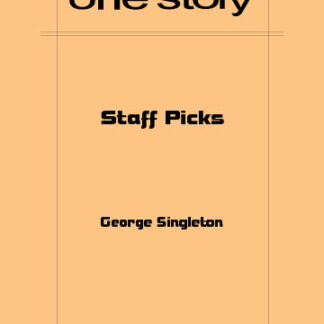
Staff Picks
$2.50
110 in stock
Excerpt
According to the radio station’s rules, the contestants were permitted to place their hands anywhere on the RV they felt comfortable. Staff Puckett chose the Winnebago’s spare tire, which was sheathed in vinyl emblazoned with the image of Mount Rushmore. Staff had considered visiting the granite sculpture, off and on, for twenty years, and now she vowed to herself that soon she’d make her way northwest on mostly back roads to stare down those four faces, whose stony expressions didn’t look much different than her own.
But first she had to win the RV. She’d been one of the nineteen nineteenth callers during WCRS’s nineteen-day “19th Nervous Breakdown” marathon. Now she and the other eighteen contestants were gathered in the parking lot of State Line RV World, near the border of Georgia and South Carolina. The rules were simple: This was a “hands on” contest. Contestants had to remain in contact with the RV. The last one standing got the keys.
A man to Staff’s left stuck his hand on the taillight, and a woman with bleached hair reached up high onto the back window, which Staff thought to be a questionable move. The other sixteen contestants—including a doughy, balding man whose shirt blazed with advertising logos—chose the hood, windshield, door handles, random snatches of stripe.
“Good morning,” the balding man said. While he waited in vain for Staff’s reply, he gave her what seemed to be a sincere smile, which led Staff to believe that he wouldn’t last long.
George Singleton
George Singleton has published seven collections of stories, two novels, and a book of advice. Since 1986, he has published over three hundred short stories, which have appeared in The Atlantic, Harper’s Magazine, Georgia Review, Zoetrope: All Story, Playboy, Agni, Southern Review, Ninth Letter, and elsewhere. He has received a Pushcart Prize, the Hillsdale Award for Fiction, and the John William Corrington Award for Literary Excellence. Singleton was inducted into the Fellowship of Southern Writers in April 2015. A Guggenheim fellow, he holds the John C. Cobb Endowed Chair in the Humanities at Wofford College in Spartanburg, South Carolina.
Will Allison on “Staff Picks”
There’s an old show business saying: “Dying is easy. Comedy is hard.” You could argue that this is even more true in literary fiction, where characters die all the time, but precious few stories offer much in the way of laughs. If you feel the same, then the story in our new issue, George Singleton’s “Staff Picks,” is for you.
Like many of Singleton’s stories, the premise of “Staff Picks” sounds like the setup for an elaborate and possibly off-color joke: What happens when a South Carolina woman with “resting bitch face” takes on eighteen locals in a hands-on endurance competition to win an RV?
Rest assured, the resulting story is funny. But as with all of Singleton’s work, it’s no joke. The author’s favorite bit of writing advice? Comedy is serious. “On the page,” he says in our author interview, “it’s not slapstick. It’s what Aristotle pointed to when he wrote about catharsis, and what Mr. Beckett meant when he espoused how there’s nothing funnier than human misery.”
In “Staff Picks,” the human misery begins with Staff Puckett, who, through no fault of her own, has the sort of deadpan visage that makes it look like she wants to vaporize you. Suffocating in her small-town life as a library archivist, Staff sees a possible escape in the brand-new Winnebago being offered as a prize to whichever contestant can remain in physical contact with the vehicle the longest.
What Staff doesn’t bargain for is fellow contestant Landry Harmon, a doughy, chatty, low-level pro bowler with whom she has more in common than she knows. Throw in a swindling jeweler, an insecure poker player, some goofy radio deejays, the periodic table of elements, British fine china, and a lightning storm, and you have the makings of a classic George Singleton tale that we’re tickled to present in the pages of One Story.
Q&A by Will Allison
- WA: Where did the idea for this story come from?
- GS: I think I got rooked by an estate jewelry place. The guy said a ring and locket weren’t worth anything, he offered me some money, and then two weeks later I saw those pieces online going for over ten times what he paid me. I contacted him. I said that I had the memory of a mule. Although the store and jeweler’s name is different—and I’ve never done any vandalism to the guy’s establishment—it wasn’t hard to sit down with a conflict in mind.
- WA: Staff Puckett, the story’s protagonist, possesses what has come to be known in pop culture as a “resting bitch face” or “RBF,” a phenomenon characterized by the Washington Post as “a certain unintentional expression when [one’s face is] not in motion—a look best described as vaguely annoyed, maybe a little judgy, perhaps slightly bored.” This quality has been ascribed to actress Kristen Stewart, Queen Elizabeth, and Kanye West, among others. What made you want to write about a character with RBF?
- GS: I have a student. She’s taken two classes with me in the English department at Wofford. Porcelain dolls have more expression on their faces. This student’s a great, complex stew—she’s country as all get-out; she has a 4.0 average as a biology major on her way to med school; her granddaddy’s always in trouble because he owns a strip joint that’s forever getting busted for its exotic dancers agreeing to perform illicit acts; and so on. Her daddy’s a construction worker. This student—she’d kill me if I gave away her name—taught me the term “resting bitch face” one day when I stared back at her as if I’d just returned from a lobotomy procedure. Okay, so when I brought in Staff, I thought of her as a smarter-than-the-locals, bored archivist. And if I were a smarter-than-the-locals, bored archivist, I believe I might refrain from moving too many facial muscles.
- WA: What was the most challenging aspect of writing this story?
- GS: Making the plot more plausible. I know that the editors helped me immensely in getting particular scenes and coincidences to be more believable. Parts of this story might still take some special willing suspension of disbelief on the reader’s part.
- WA: The main action of this story takes place during a “hands on contest,” wherein participants try to outlast one another by maintaining physical contact with whatever the prize is—in this case, a Winnebago. Have you ever participated in such a contest?
- GS: Yeah, for a mean, black angus bull. No, I’m just joking. It was for a copperhead snake, one time when I was over at Sand Mountain, Alabama.
- WA: I think it’s safe to say that most readers who are familiar with your work would be able to recognize a George Singleton story—based on your cadence, tone, brand of humor, etc.—within a few sentences or paragraphs, reading blind. Do you recall how and when you developed your writing style?
- GS: This story takes place with a third-person narration, and that’s difficult for me. I wrote in third-person for about the first eight years of my so-called writing career. More than a few people—friends and professors—said, “You need to write in first person. You’re not using your voice.” So when I first started writing stories in first-person, I started getting published. All of these stories, I would imagine, rely upon a narrator who doesn’t quite understand how things take place around him (usually him) or why. He might bring along a certain tone that he’s smarter than his comrades, and then, eventually, he gets his comeuppance. About twice a year, though, I’ll write a third-person story, solely to shake off the rust. I hate writing in third person. I love everyone else’s third-person stories, but I feel as though someone’s pulling the reins on me, and the bit digs into my mouth when I attempt third-person narrations. Anyway, to your question. My father was a merchant marine. He ran away from his Dallas home at age sixteen, thus having a tenth grade education. But man oh man was he a smart aleck, great BS-ing storyteller. I listened a lot. And for some reason he thought it necessary to drive me around the South as a child, meeting people from all walks of life. He’d talk and talk. I must’ve listened.
- WA: In addition to your seven story collections, you’ve published two novels. How would you compare story writing to novel writing?
- GS: Whoo-whee. The two novels developed out of short stories bloating awry, to be honest. I am not a good novelist, probably because my heart’s not in it. Sometimes, over the years, I’ve sat myself down and said, “Okay, write a novel.” I talk to myself a lot. “Okay, go cut the grass.” So I’ll sit down and after a few months might have a big, old, bad, hairy, over-the-top narrative of sorts. Some readers might notice that a collection of mine sometimes has a character that showed up in a previous collection. That’s because, more than likely, I went and whittled down an unsalvageable novel into two or three short stories or a novella. A sonnet. Haiku. One exhalation of breath to no one, out on my back deck. I admire novelists, and I read novels. Maybe I don’t have the patience. I bore myself, at times, over the long haul. Randall Jarrell said that the chances of writing a great poem are the same as sitting in a lawn chair in your yard at night and having a meteor fall into your lap. I have this belief that it’s possible to write a great short story. Great novel? Not for me. But I’m still optimistic enough to think that I can, one day, write what might be considered a great short story.
- WA: How long did it take you to complete this story?
- GS: Probably, for the first rough draft, about seven days. Then about three weeks of tinkering. Then after y’all took it, lots of great editing suggestions.
- WA: What are you working on now?
- GS: Dig this. Usually I sit down and think about some kind of theme or whatever for the next collection: stories wherein all the characters live in a town called Forty-Five; stories that all have a stray dog; stories that have characters all living in a place called Calloustown; and so on. Maybe two years ago, I thought about writing stories, each taking place on a holiday—not just Valentine’s Day or New Year’s, but some of the bizarre, nearly made-up holidays. I got to work. Maybe I placed eight of these stories, but they seemed forced. Then it came to me: write a collection called Staff Picks. Then it’ll be in an indie bookstore, right up top of a shelf somewhere near the front, with Staff Picks (Stories) by George Singleton on the cover. Then people will walk up and say, “Hey, this must be a great collection—it’s one of the staff picks...” Luckily, my first stab at a prospective titular story was this one. So, should I ever, ever publish another collection, which is questionable, this story—One Story’s story—will provide the title.
- WA: What is the best bit of advice about writing you have ever received?
- GS: “Comedy is serious.” Plain and simple. On the page, it’s not slapstick. It’s what Aristotle pointed to when he wrote about catharsis, and what Mr. Beckett meant when he espoused how there’s nothing funnier than human misery.
